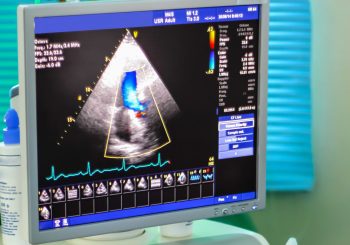
A focused left ventricular transthoracic echocardiogram (TTE) option offered as a substitute for full echocardiography was associated with a decrease in the number of full echocardiograms, according to a new research letter published in JAMA Internal Medicine. Researchers evaluating the use of a left ventricle transthoracic option added by the Veterans Affairs Palo Alto Health Care System (PAVA) compared the TTE volume and TTEs per 200 outpatient visits between the PAVA group and control groups.
Linear regression analysis showed an increase in the use of limited TTEs (P<0.001), but not total TTEs. Limited TTEs as a percentage of total TTEs also increased (from 0.8% in 2005 to 19.5% between 2011 and 2015). Multivariate regression analysis suggested that the introduction of limited left ventricular TTEs was associated with more limited TTEs (P<0.001), but not an overall increase in TTEs.
“A focus of high-value care has been eliminating unnecessary testing. Another approach would be to identify lower-cost alternatives,” the authors wrote in their discussion. “Our study suggests that echocardiography testing can be redesigned to answer focused questions important to clinicians while reducing health care spending.”
if you're really interested in "less is more" and eliminating unnecessary echocardiograms, may I suggest adopting smartphone ultrasound as part of your physical exams?https://t.co/wcKwgmF7eg @JAMAInternalMed by @StanfordMed @paheidenreich @Jpari86 pic.twitter.com/nGsffFJKkl
— Eric Topol (@EricTopol) July 23, 2018
@StanfordDeptMed @ATSandhu @PAHeidenreich @Jpari86 show introducing limited TTEs at PAVA led to reduction in full TTEs. Innovative way to reduce healthcare spending by adapting the diagnostic test to the clinical question. https://t.co/gXsJWcfvfT Podcast: https://t.co/8onJEBaviS
— Iris Ma, MD (@hospitaliris) July 24, 2018
@sccm #PedsICU @jerjohzimm #LessIsMorehttps://t.co/wuqiBOano0
Echocardiography testing can be redesigned to answer focused questions important to clinicians while reducing health care spending. Responsible use of resources means ordering needed tests, not more and not less.— Lauren R. Sorce, PhD, RN, CPNP-AC/PC, FAAN, FCCM (@SCCMPresident) July 24, 2018
It would be interesting to see how many of the limited echos were in cancer patients who needed monitoring of EF in setting of oncology treatment (e.g. trastuzumab) #CardioOnc @JPUsdin @Ron_Witteles https://t.co/pUkiMxNJIM
— Javid Moslehi (@CardioOncology) July 24, 2018
Interesting paper in @JAMAInternalMed. Encouraging limited TTEs didn't reduce req for full TTEs much (82 fewer scans) but added lots of limited studies (350 more).
Also, from intro: could be $100 million spent by Medicare on inappropriate echos annually!https://t.co/jiKg48lIMz
— Venk Murthy MD PhD (@venkmurthy) July 23, 2018
Association Between Offering Limited #LVEF #Echocardiograms and Overall Use of Echocardiography. A Open Window to #Cardio-oncology. @JPUsdin https://t.co/02hteTz4Uy
— Jean Pierre Usdin (@JPUsdin) July 24, 2018
Can left ventricle trans-thoracic echos be used in place of full TTEs? Find out in this new pub from A Sandhu, J Parizo, N Moradi-Ragheb, & @paheidenreich in @JAMAInternalMed https://t.co/XuCEDhI4EF
— VA HSR (@vahsrd) July 23, 2018
Source: JAMA Internal Medicine
Related: Artificial Intelligence Matching Human Cardiologist’s Ability to Identify Cardiovascular Disease.







 © 2025 Mashup Media, LLC, a Formedics Property. All Rights Reserved.
© 2025 Mashup Media, LLC, a Formedics Property. All Rights Reserved.